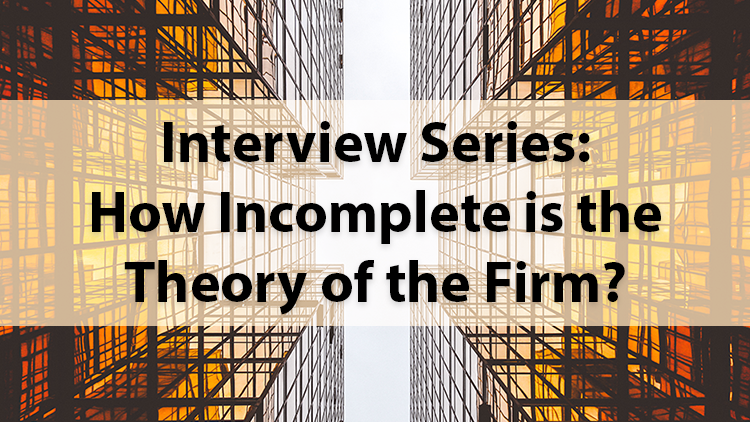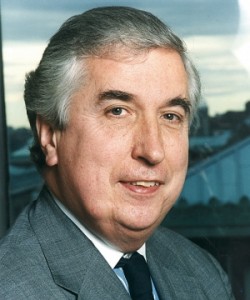In this installment of ProMarket’s new interview series, Columbia Law School’s John C. Coffee Jr. shares some thoughts on political engagement by corporations. “Milton Friedman seems to have been wrong in his insistence that directors consider only the interests of shareholders.”
On March 3-4, the Stigler Center at the University of Chicago Booth School of Business, along with Harvard Business School and Oxford University, hosted a conference in Chicago to answer the following questions: Should the economic theory of the firm be modified? And if so, how?
The standard (economic) theory of the firm is silent on the role firms can play in shaping the rules of the game under which they operate. In reality, many firms lobby politicians and try to capture regulators in order to modify the rules of the game in their favor. Some scholars have argued that the resources devoted to these activities are relatively so small that they are likely to have insignificant effects, and/or that regardless of how much firms invest in political activities, in a well-functioning democracy there are countervailing forces that effectively level the playing field. Other scholars have noted that the resources firms devote to shaping the rules of the game to their own advantage are sufficiently large and their effects sufficiently important to warrant a rethinking of the standard economic theory of the firm. Which of these two views has more empirical support? If the latter, should the economic theory of the firm be modified? If so, how, and is the potential fix better or worse than the existing problem?
The following interview with Columbia law professor John Coffee is part of an interview series with influential scholars who are addressing these issues in their work. You can view all previous installments here.
John C. Coffee Jr. is the Adolf A. Berle Professor of Law and director of the Center on Corporate Governance at Columbia Law School. He is a fellow at the American Academy of Arts and Sciences and has been repeatedly listed by the National Law Journal as one of its “100 Most Influential Lawyers in America.” He is the most cited law professor in law reviews over the last 10 years in the combined corporate, commercial, and business law field, and in 2015, Lawdragon listed him on its 100-member “Hall of Fame” list of influential lawyers in the U.S.
In a brief interview with ProMarket ahead of the upcoming conference on the theory of the firm, Coffee shared some thoughts on the role of corporations.
Q: The neoclassical theory of the firm does not consider political engagement by corporations. How big of an omission do you think this is?
The problems in expanding the theory of the firm to consider political engagements are considerable. Of course, political engagement by firms can be viewed as merely rent-seeking. Unavoidably, this produces waste. If competing firms all engage politically with their regulators (even if only up to the point where their marginal costs equal their marginal benefits), such duplicative expenditures on the opposite sides of political and regulatory issues waste resources (and possibly also corrupt the political system).
But before one jumps to the conclusion that therefore corporations should be denied the right to influence political decisions in the interests of efficiency, more must be considered. For example, last month, over one hundred public corporations, most of them high-tech firms, filed a brief opposing the legality of the executive order signed by President Trump barring various immigrants.((See Greg Bensinger and Rachael King, “Tech CEOS Take a Stand,” Wall Street Journal, February 7, 2017, at B-1.)) This can be viewed as collective action by firms in defense of capitalism and the free flow of goods and services. Those opposed to firms lobbying regulatory agencies would probably approve this defense by corporations of human rights. Nor was this case unique. Corporations, like Apple, Facebook, and Google, have regularly defended human rights.
What this implies is that any absolute, prophylactic rule against political engagement may be undesirable. How then should we distinguish between “good” and “bad” political engagements by corporations? One approach might be to refine the rules of corporate governance and give shareholders greater rights in the process. To the extent that shareholders are diversified, they should rationally oppose rent-seeking by competing firms, as such activity just raises the costs for both sides.
Conversely, however, in concentrated industries where collusion is more likely than competition, diversified shareholders might rationally support rent-seeking (and even reduced competition) by the firms in which they invest. Some empirical evidence suggests that investors in the highly concentrated airline industry have behaved this way. Hence, stronger corporate governance may supply a partial answer sometimes, but hardly always. At best, it can add transparency to the process, thereby making rent-seeking less feasible.
Theorists of the firm who wish to restrict political engagements by firms face a serious problem that they have not yet recognized: at least in the United States, corporate political engagement may be protected by the First Amendment. This means that reforms such as disclosure are possible (and, I think, desirable), but stricter, prophylactic rules are probably not.
Q: To what extent is political engagement by corporations responsible for the current populist discontent?
This question will likely provoke a number of superficial responses. To be sure, many are unhappy that few executives (if any) went to prison after the 2008 financial meltdown (but these critics may not adequately understand our criminal justice system or the requirement
s of due process). Those “populists” who supported Donald Trump seemed to have been even more concerned about immigration, affirmative action, and a variety of social issues (abortion, same sex marriage, etc.). Although corporate redeployment of plants and services overseas certainly enhanced the fears and discontent of the “populists,” a corporate preference for free trade is at the heart of modern global capitalism. A theory of the firm that encourages a return to “America First” isolationism would hardly be an advance or consistent with economic theory.
Q: The World Economic Forum has called for “reimagining” and “reforming” capitalism. To what extent is this need for reform the result of disruption brought by technological change, globalization, and immigration and to what extent is it the effect of rent seeking and regulatory capture?
No mistake about it: a revolt against globalization is underway! But that does not mean that we should retreat to small villages and an agrarian economy. The better answer might be acceptance of some principles of corporate social responsibility and the recognition that stakeholders do have valid interests that need not always be subordinated to those of stockholders in the name of efficiency. Interestingly, the latest empirical evidence suggests that firms that comply with norms of corporate social responsibility actually outperform firms that do not.((See Allen Ferrell, Hao Liang, Lue Renneboog, Socially Responsible Firms, 122 J. Fin. Econ. 585-606 (2016).)) At the risk of committing sacrilege in Chicago, Milton Friedman seems to have been wrong in his insistence that directors consider only the interests of shareholders.
Q: Some people describe Donald Trump’s economic policies as “corporatism.” Are you more worried by Trump’s interference in the market economy or by companies’ ability to subvert markets’ rules?
I am more worried about the latter (i.e., subversion of market rules). It is too soon to judge Trump’s impact, which may prove more modest than it appears today. In any event, any revised theory that pays much attention to Donald Trump may have only a brief moment of relevance.







